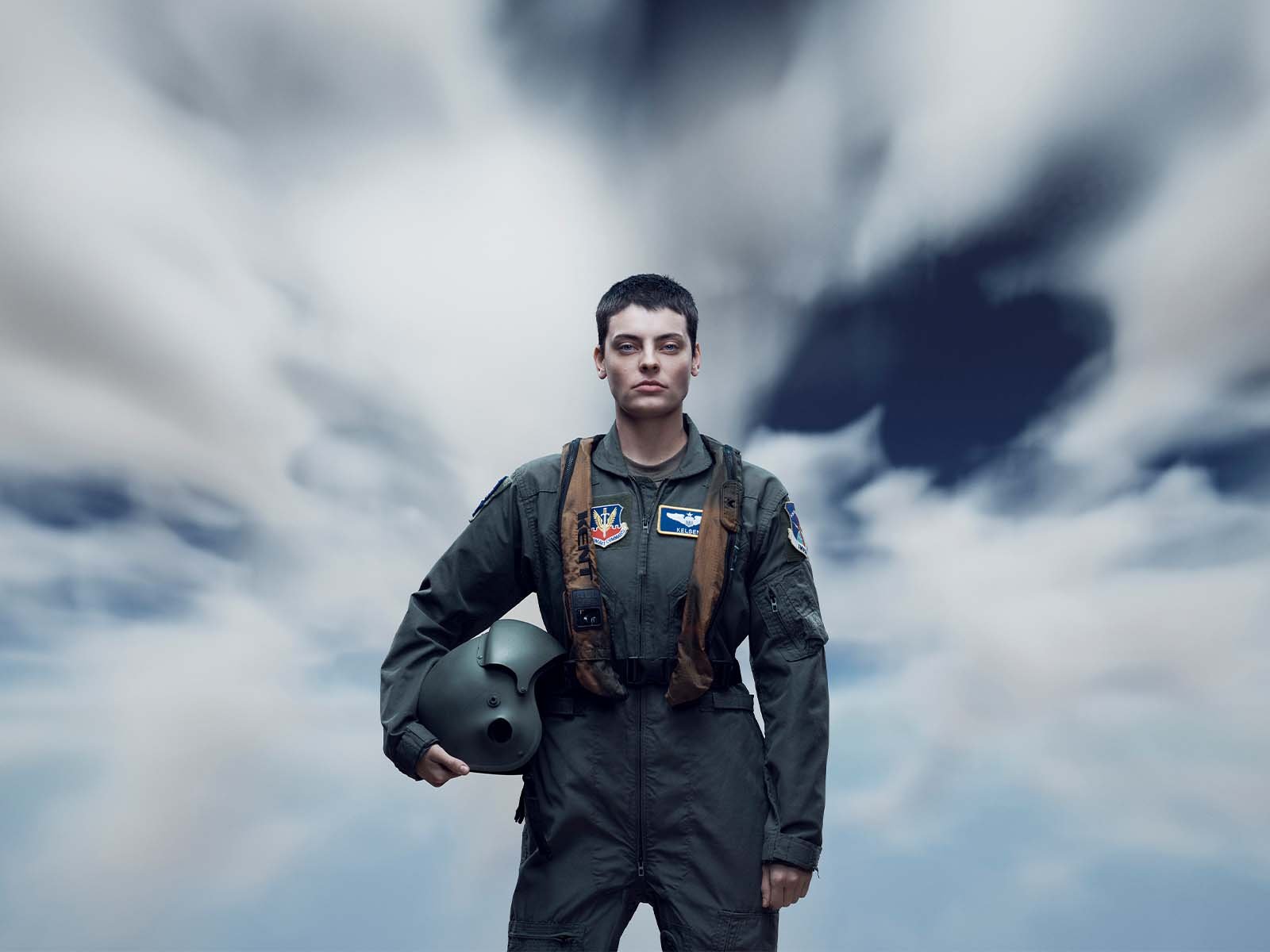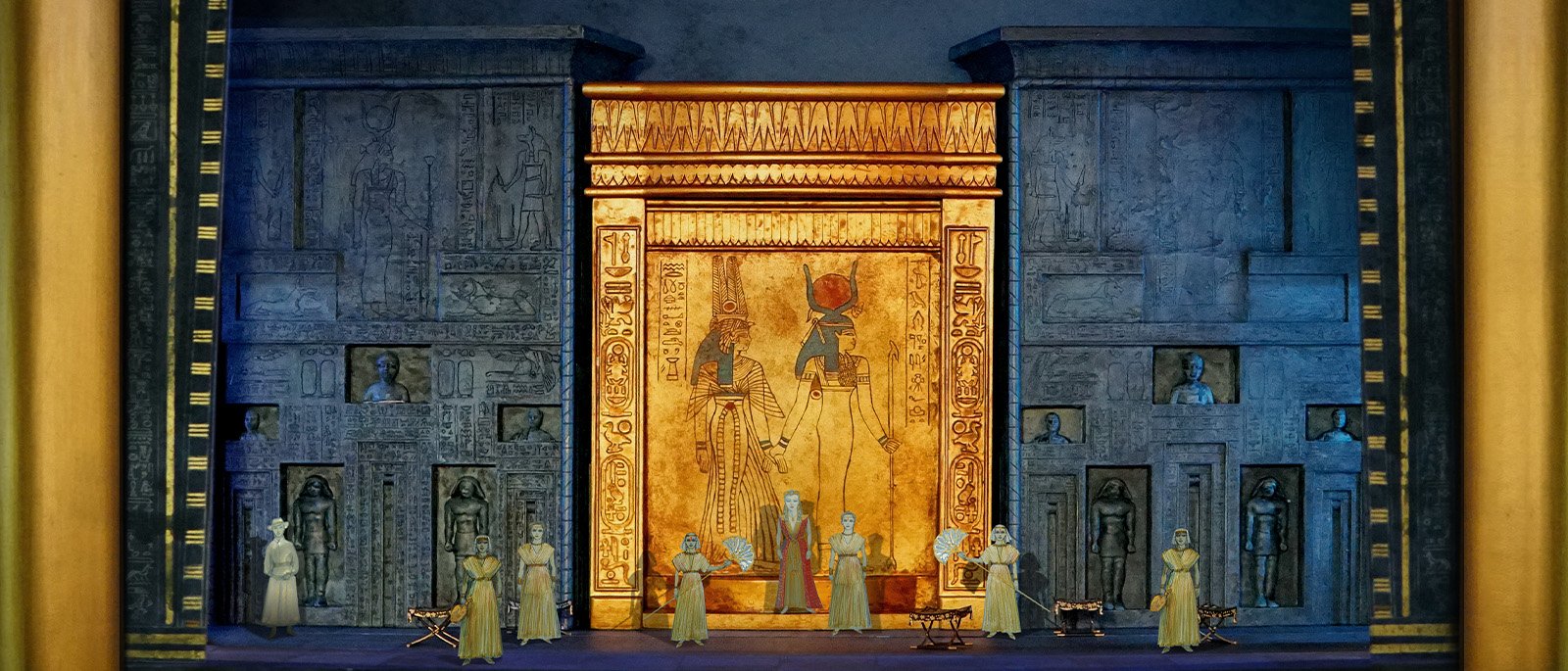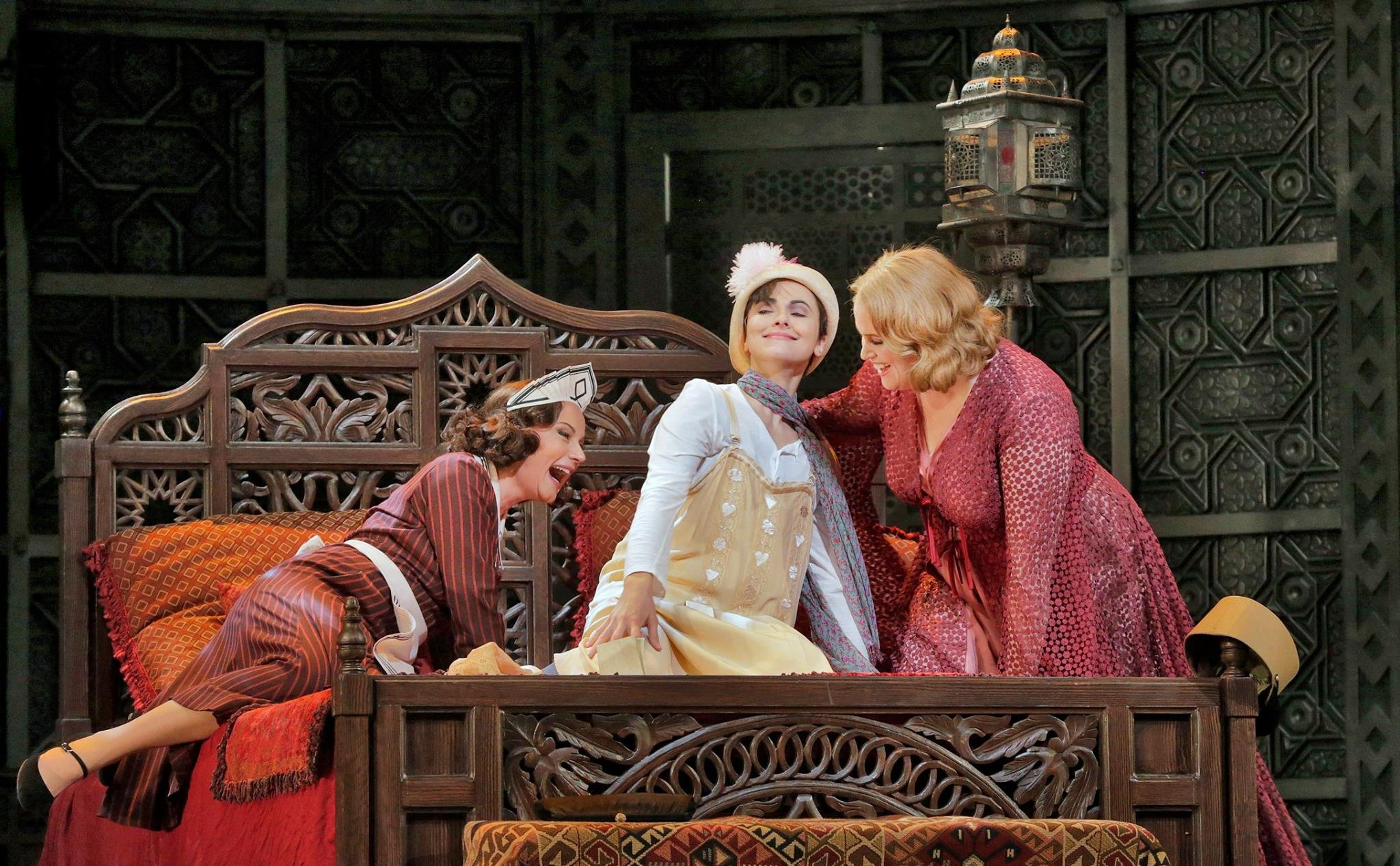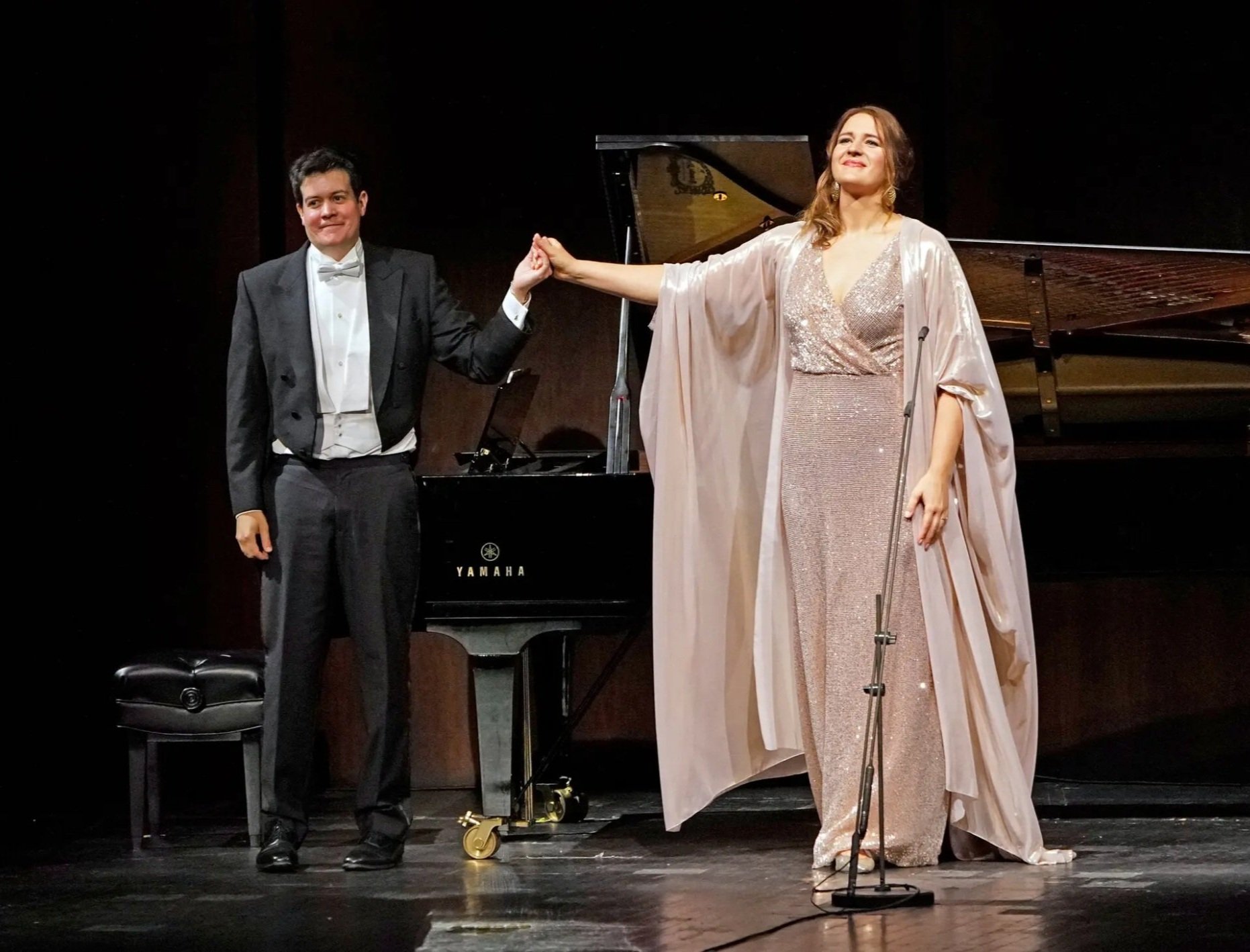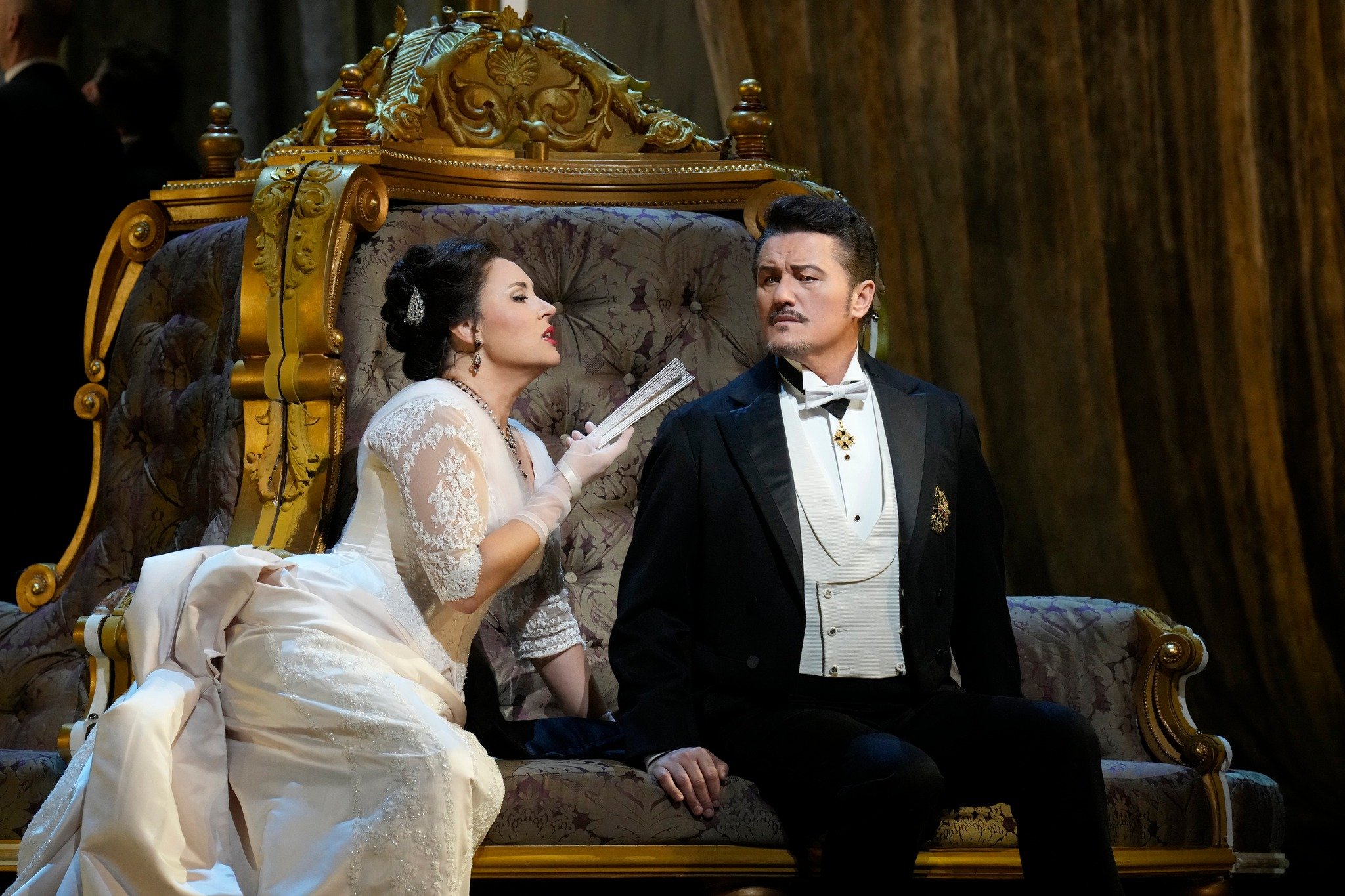Highlights of the Met’s 2024-25 Season
Emily D’Angelo in a photoshoot for Grounded (Paola Kudacki/Met Opera)
On February 23, the Met Opera announced their 2024-25 season. Notably for nitpicky me, I’m excited for almost everything. This season, The Magic Flute was the sole comedy, but next year we get that, its full-length German version, plus two Figaro operas. There’s an opening night for Emily D’Angelo in Grounded, the returns of beloved artists like Pretty Yende and Elīna Garanča, and the first collaboration of conductor Keri-Lynn Wilson and star soprano Sonya Yoncheva in The Queen of Spades. It was difficult to choose, but read on for the five shows I’m most looking forward to.
Aida
A model of the set for Aida
This New Year’s Eve, Michael Mayer brings to the Met the first new production of Verdi’s epic Aida since 1988. (I would have gladly kept the old one until 2088.) The new staging, while it looks quite classic, presents the events as being discovered by a modern-day archaeologist deciphering hieroglyphs. I hope that this perspective, as with all novelty, is interesting rather than just new. I’m determined, however, to give Mayer’s Aida a chance.
The titular Ethiopian princess is sung first by the world-class Angel Joy Blue and then Christina Nilsson, of the same country and name as the great Victorian soprano. Judit Kutasi, who made her debut last Monday as Preziosilla in La Forza del Destino, sings the imperious Amneris from December to March before four performances from Elīna Garanča. Elīna hasn’t sung at the Met in four years, and the graceful sophistication she and her voice possess is perfect for Amneris. Someone explain to me why she’s not singing the HD on January 25.
Polish tenor Piotr Beczała, at the top of the opera world, sings the Egyptian general Radamès for eight performances before Brian Jagde (pronounced “jade”) takes over the run. The stars’ schedules look chaotic on paper, but the bottom line is that Angel, Elīna, and Piotr will not be singing all together, though Angel will be singing with both of them at different times. There’s a block of five performances in March with the three alternate leads. In the role of Aida’s royal father, Amonasro, we have no fewer than four superb baritones: Quinn Kelsey, Eric Owens, Michael Chioldi, and Amartuvshin Enkhbat.
Whatever the merits of the production may end up being, the cast makes it more than worth seeing. Go twice at least for maximum rhapsody.
Dates: December 31, January 4, 7, 10, 14, 18, 21, 25, March 14, 18, 22, 26, 29, April 27, May 1, 5, 9
Cast: Yannick Nézet-Séguin/Alexander Soddy/John Keenan (conductor), Angel Blue/Christina Nilsson, Piotr Beczała/Brian Jagde, Judit Kutasi/Elīna Garanča, Quinn Kelsey/Eric Owens/Michael Chioldi/Amartuvshin Enkhbat, Dmitry Belosselskiy/Alexander Vinogradov/Morris Robinson
Ainadamar
Gabriella Reyes and the Detroit Opera in Ainadamar (Detroit Opera)
Flamenco classical arrives at the Met this fall with Argentine composer Osvaldo Golijov’s Ainadamar. It tells the story of Spanish poet Federico García Lorca and actress Margarita Xirgu, who carried on her friend’s legacy after his 1936 execution by Francisco Franco’s forces.
Opera in Spanish made a comeback at the Met last season with Daniel Catán’s outstanding Florencia en el Amazonas. Florencia and Ainadamar, however, are very distinct sides of ópera en español. Florencia’s score is influenced by legendary classical composers like Puccini, whereas Ainadamar is infused with delicious flamenco. I had only to listen to Margarita’s opening ballad and I was hooked.
Brazilian director Deborah Colker’s production is shared with the Detroit Opera and the Scottish Opera, among others. In Detroit, Lorca and Xirgu were sung by Argentine mezzo-soprano Daniela Mack (Golijov’s Lorca is a trouser role) and stunning Nicaraguan-American soprano Gabriella Reyes. In New York, Daniela reprises her role for the entire run, while Gabriella, unfortunately, gets only one performance, on October 30. Angel Blue gets the rest of the run.
Normally, I would be thrilled to hear Angel in anything, but here’s the deal: Latino zest is impossible to reproduce, not to mention authentic Spanish pronunciation, and Latino operas need that cultural flavor. As ravishing as Angel is, I’m going to see Gabriella. Cuban-American soprano Elena Villalón as Xirgu’s student Nuria and Spanish flamenco singer Alfredo Tejada as Ramón Ruiz Alonso, the fascist behind Lorca’s arrest and murder, round out the cast.
Furthermore, the Met is presenting only 8 Live in HD transmissions next season, instead of the customary 10, which means that only three of the six new productions will get the cinema treatment. Ainadamar is not one of the lucky three, even though, if you ask me, its Met premiere is far more significant than the new Salome. (Don’t mind me, though, I’m allergic to heads without bodies.) We have no alternative but to dash to see Ainadamar live.
Dates: October 15, 19, 22, 25, 27, 30, November 2, 6, 9
Cast: Miguel Harth-Bedoya (conductor), Angel Blue/Gabriella Reyes, Daniela Mack, Elena Villalón
Fidelio
Lise Davidsen in Fidelio (Tristam Kenton/The Observer)
Although Beethoven may have been the greatest composer of all time, he wrote only one opera. That one opera was so much trouble to him — he wrote no fewer than four overtures for it — that he vowed never to compose another. He kept that vow, and so Fidelio is the sole testament that the opera world has of Ludwig’s genius.
Yet what a testament it is! The overture (the most often used one) is a gem, the prisoners’ chorus is a literal breath of fresh air, the quartet “Mir ist so wunderbar” is a prime example of how a single melody can convey many emotions, and Leonore gets a seven-minute heroic aria, “Abscheulicher! … Komm, Hoffnung". I can’t understand why many people consider Fidelio an okay opera; Glyndebourne points out the drama’s “stiffness and formality” and Gramophone calls it “difficult… to appreciate.” Not for me…
Lise Davidsen sings the selfless Leonore, who disguises herself as a boy to infiltrate the jail where her husband is a political prisoner. At only 37, Lise has already distinguished herself as one of the great dramatic sopranos, singing Strauss’s Ariadne and Wagner’s Sieglinde and Elisabeth, among others, to popular and critical rapture. She was scheduled to sing Leonore at the Met during the 2020-21 season, but the whole season was canceled due to the pandemic, and her New York Fidelio was moved to March 2025.
Ying Fang lends her silvery voice to Marzelline, who falls in love with “Fidelio” without knowing that “he” is really Leonore, and Magnus Dietrich makes his company debut as Jaquino, the young man pining for Marzelline. Renowned German bass René Pape sings Rocco, the prison’s kindly jailer and Marzelline’s father, and tenor David Butt Philip sings Florestan, Leonore’s incarcerated husband.
There are only five performances; the pandemic deprived us of Lise’s Leonore in 2020, so don’t miss your chance in 2025.
Dates: March 4, 7, 10, 12, 15
Cast: Susanna Mälkki (conductor), Lise Davidsen, Ying Fang, René Pape, David Butt Philip, Magnus Dietrich, Tomasz Konieczny, Stephen Milling
Le Nozze di Figaro
From left: Anita Hartig, Isabel Leonard, and Rachel Willis-Sørenson in Le Nozze di Figaro (Ken Howard/Met Opera)
It is a truth universally acknowledged that Mozart’s Le Nozze di Figaro is a masterpiece. Some say it is his best opera. Some say Don Giovanni is. Some say Nozze is perfect. I think it drags a little in Act 3, but it is certainly among the crown jewels of opera. The comedy is lively, Lorenzo da Ponte’s libretto is tight and flowing, and the music is exquisite. There’s a crafty valet, his craftier fiancée, a womanizing count, a long-suffering countess, an adolescent page, an old contract, and a hairpin. Countless antics and plots tangle in just one day — will we ever get to the wedding?
Next season, we’re treated to a revival with two superb casts, and even an HD! Joana Mallwitz, the first female chief conductor of the Konzerthausorchester Berlin (say that three times fast), leads the Met Orchestra in her debut. Ukrainian soprano Olga Kulchynska trades off with the divine Rosa Feola as the wily maid Susanna, who pulls the strings in the action. Federica Lombardi repeats her successful Countess Almaviva, who she sang here in 2022, before Jacquelyn Stucker takes over for her Met debut.
Count Almaviva, the philandering head of the household, is sung by first Joshua Hopkins and then Adam Plachetka, while bass-baritones Michael Sumuel and Luca Pisaroni trade off as the witty Figaro. Interestingly, both Plachetka and Pisaroni have sung each other’s roles at the Met. Marianne Crebassa sings the pants role of the page Cherubino before passing the run to Emily D’Angelo, who gets her long-due recognition when she opens the season. She is special.
It is no detriment to Kulchynska or Crebassa, both of whom are excellent, when I say that frankly, the second cast should have been given the HD on April 26. Rosa is rapidly and deservingly becoming a star soubrette and Emily seems fated for greatness. Add in that Plachetka and Pisaroni have worthily headlined Nozze many times but never in an HD, and I can’t help feeling just a bit disillusioned.
Dates: March 31, April 5, 8, 11, 13, 18, 22, 26, May 3, 7, 10, 14, 17
Cast: Joana Mallwitz (conductor), Federica Lombardi/Jacquelyn Stucker, Olga Kulchynska/Rosa Feola, Michael Sumuel/Luca Pisaroni, Marianne Crebassa/Emily D’Angelo, Joshua Hopkins/Adam Plachetka
Tosca
Željko Lučić and the Met Opera Choruses in Tosca (Met Opera)
If ever there was an operatic thriller, Tosca is it. A sadistic police chief, an escaped prisoner, offstage torture, and a deal with the devil make Puccini’s Roman drama perhaps the most terrifyingly suspenseful in the repertory. However, dwelling too much on the work’s thrills and chills does it a disservice; first and foremost, it’s gorgeous.
Tosca is rightfully one of the most popular operas in the repertoire, and the Met consistently performs it every other season. In 2024-25, they are set to indulge us with some of opera’s most renowned artists, spread across three different casts. Cast #1 features Aleksandra Kurzak, making the move from lyric to verismo roles, as Tosca herself; SeokJong Baek, now triumphing as Calàf in the Met’s Turandot, as the painter Cavaradossi; and Georgian baritone George Gagnidze as the sadistic Baron Scarpia.
Now it gets really thrilling. Cast #2 stars none other than Lise Davidsen, who specializes in Strauss and Wagner but is proving her merits in Italian fare (currently Verdi’s La Forza del Destino). She recently debuted Tosca in concert with tenor Freddie De Tommaso, who will also be her Cavaradossi in New York for his highly anticipated debut. With his very first Scarpia, Hawaiian Quinn Kelsey will cement his status as the Met’s finest Verdi baritone. He can be truly frightening onstage — perfect.
Unlike #2, Cast #3 highlights singers familiar with superstardom. Sondra Radvanovsky, the electrifying spinto soprano, returns after a season away to sing one of her signature roles. Welsh bass-baritone Bryn Terfel sings Scarpia; he hasn’t sung at the Met in more than a decade and will surely be given a warm welcome by the audience. Finally, though stalwart-voiced tenor Brian Jagde is the youngest in Cast III, he has already sung Cavaradossi to acclaim both in New York and elsewhere. Xian Zhang conducts all performances except for on October 6, which will be led by Marco Armiliato.
I’m not going to repeat myself by telling you to attend something more than once, so just see everything as many times as you can!
Dates: September 25, 28, October 3, 6, 11, November 12, 15, 19, 23, January 9, 12, 17, 23
Cast: Xian Zhang/Marco Armiliato (conductor), Aleksandra Kurzak/Lise Davidsen/Sondra Radvanovsky, SeokJong Baek/Freddie De Tommaso, Brian Jagde, George Gagnidze/Quinn Kelsey/Bryn Terfel
Other 2024-25 new productions: Antony and Cleopatra, starring Julia Bullock and Gerald Finley; Grounded, starring Emily D’Angelo; Moby-Dick, starring Brandon Jovanovich; Salome, starring Elza van den Heever.
Other revivals: Il Barbiere di Siviglia, starring Isabel Leonard/Aigul Akhmetshina; La Bohème, starring Ailyn Pérez/Gabriella Reyes/Eleonora Buratto/Kristina Mkhitaryan/Corinne Winters; Les Contes d’Hoffmann, starring Benjamin Bernheim; Die Frau ohne Schatten, starring Elza van den Heever; The Magic Flute, starring Hera Hyesang Park/Emily Pogorelc; Rigoletto, starring Nadine Sierra/Erin Morley and Quinn Kelsey/Luca Salsi/Michael Chioldi; Il Trovatore, starring Rachel Willis-Sørensen/Angela Meade and Michael Fabiano; Die Zauberflöte, starring Golda Schultz and Kathryn Lewek.

